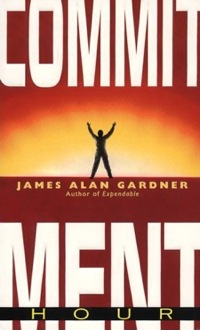The best thing about James Alan Gardner’s Commitment Hour (1998) is the voice. Fullin speaks in confident confiding first person. He’s sure of himself, sure of the odd society he lives in, and at the same time he’s unsure of himself, his world, everything, because he’s twenty, and his certainties are being questioned. Also, he’s been alternating between male and female every year all his life, but tomorrow he’s going to have to make a permanent choice—male, female, or both, even though choosing “both” also means choosing exile. The most interesting thing about Fullin, his world and options, is that he thinks he’s living in a low tech fantasy world, full of gods and magic and rituals and taboos, when in fact it’s quite clear to the reader as the story goes on that this is a post-technological, indeed, post-singularity society. Fullin’s personal story is interesting, and even more fascinating is the embedded story of his world and how his world got to be that way. The real joy of the book is unwinding the very clever worldbuilding.
Here’s a link to the first chapter on the author’s webpage, so you can see what I mean.
The society of Tover Cove is very sophisticated, even though it has turned its back on most of the overt manifestations of technology. It’s also very Canadian in a whole lot of ways. There’s a festival on the first day it snows in which everyone keeps silence in honour of Mistress Snow, and everyone leaves their door open, and neighbours go from house to house with firewood, to demonstrate their willingness to see each other through the winter. I don’t know if this comes from any historical culture or if Gardner made it up, (I certainly never came across it elsewhere) but it’s one of the most culturally Canadian things I ever heard. All the little pieces of the culture fit together that way. The very odd things, like the children being sent off every year to change gender, and the way they accept the technology for that, seem so natural to Fullin and fit so well with the kind of way people build societies that they’re easy to accept, even as you want to know more about them.
It’s very difficult to talk about the book without over-focusing on the gender thing. It made the Tiptree Longlist, and I’m surprised it wasn’t shortlisted. 1998 must have been a very strong year for books that say interesting things about gender. And the gender thing here is fascinating—the original founders of Tover Cove had rather different ideas from the ones their descendants have adopted. They’ve outlawed the “neuters,” who are actually hermaphrodites, and despite everyone having experience of both and a choice of which gender to keep, they’ve more gender essentialism than the other low tech societies around them. We see Fullin hesitating from inside. We learn than the village is roughly fifty-fifty, and everybody is really bored with answering strangers’ questions about whether sex is better as male or female. But the novel isn’t as focused on gender as discussion about it makes it seem. There’s a whole lot more to it. The society is interesting in itself, even apart from the gender thing—and while the mystery of how and why they’re doing it drives a lot of the plot, I enjoyed it more on re-reading when I knew.
Mild spoiler: My favourite part is the supposedly sophisticated outsiders pointing out that the things Fullin invests with ritual significance are technological trickery, expecting him to reject his culture, until he rolls his eyes and informs them that the technological trickery is what the gods use to accomplish their purposes, do they think he’s stupid?
Most of Gardner’s other books are set in his Expendable universe and are fun space opera. I enjoyed reading them, but I like Commitment Hour a lot more. It gives me more to chew on.
Jo Walton is a science fiction and fantasy writer. She’s published eight novels, most recently Half a Crown and Lifelode, and two poetry collections. She reads a lot, and blogs about it here regularly. She comes from Wales but lives in Montreal where the food and books are more varied.










